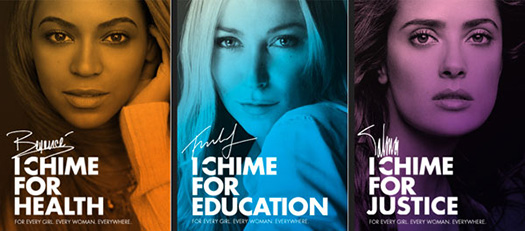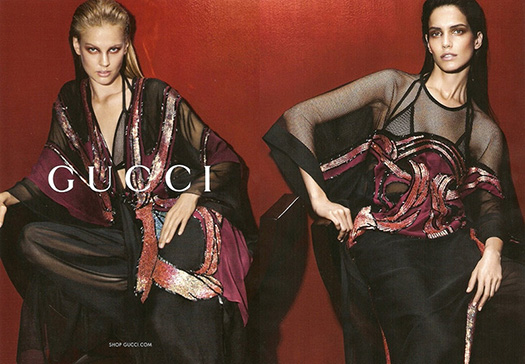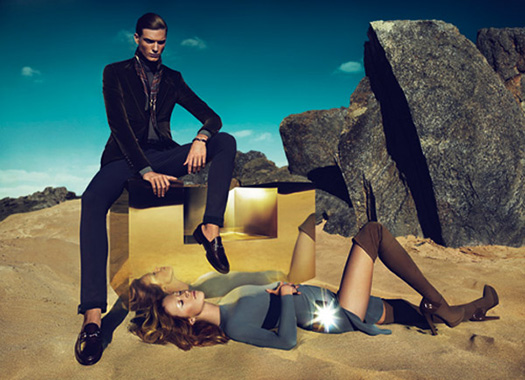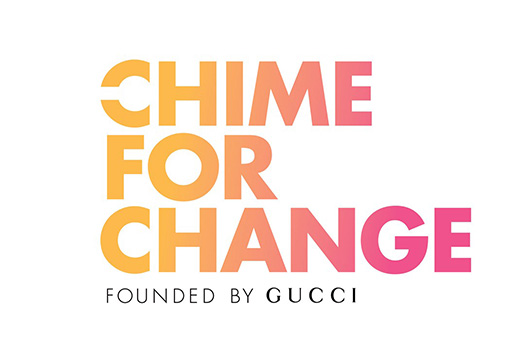A year ago, Chime for Change was born: a feminist organisation promoting health, education and justice for women and girls across the world, which was founded by Italian luxury fashion brand Gucci. Since then, it has helped raise awareness and money for a variety of causes, including taking part in the current world-wide focus on stopping a culture of rape in India.

The world is undoubtedly in need of the work that Chime for Change is doing, and an array of feminist activists from across the world such as journalist Nancy McGirr, writer Farahnaz Zahidi and Academy Award winning filmmaker Sharmeen Obaid-Chinoy, have contributed films and writings which leave a moving impression, and create what will hopefully be a successful call for real change across the globe. The public image of Gucci as a vessel for this cause, and representational questions this raises however, is an aspect that deserves consideration.
The signification of a brand which through their advertising and branding continuously promotes not only physical ideals of beauty unattainable for the vast majority of women in the world, but also products completely economically unviable for the general public of the western world they are targeting, and for the body of people they are representing through the organisation, needs addressing.

Gucci s/s 2014 ad campaign
In her essay ‘‘Be a feminist or just dress like one’’: BUST fashion and feminism as a lifestyle, academic Elizabeth Groeneveld addresses ‘girlie feminist’ magazine BUST’s lack of consideration for a variety of cultural and economic backgrounds of women. For example: ‘Her comments also indicate BUST’s implied reading audience, which here is constructed as predominantly non-Muslim women capable of choosing (in the liberal humanist sense) the aspects of fashion they wish to either support or eschew.’[ref]’Be a feminist or just dress like one’’: BUST fashion and feminism as a lifestyle‘ by Elizabeth Groeneveld (2009), available via academia.edu[/ref]
The same could be said of the young women and girls that Chime for Change hopes to help. Given the lifestyle ideals Gucci promotes, representing groups of women and girls through the brand of Gucci is via the use of a pageantry, which implies an exclusion of these very people’s economic, social, and in some cases, religious groups: Elitism for Equality!

Beyoncé performing at the Chime for Change concert organised in London in 2013
However, the problem of representation here is by no means straightforward. The very reason this organisation exists is because the women they are aiming to help are less able to represent themselves. Singer Beyoncé, one of the faces of the organisation stated: ‘There are women around the world that don’t have a voice so we have to use our voices and raise awareness and be part of something where we can leave a legacy and help improve this world.'[ref]’The sound of change rocks the world’ by Leisa Barnett, published: June 3rd 2013[/ref] If by ‘we’ she means herself and the other faces of the organisation, this is an important recognition of the privileged access to representation that the wealth and fame of Gucci and Chime for Change’s figureheads have. If however, she is referring to occidentals, or more specifically occidental women, a social and feminist representational problem arises, and western questions of female representation are ignored, as the voices of the wealthy and famous, and the voice of a female member of the general public do not have equal output.
The voice of Gucci itself in terms of self-representation before and since the founding of Chime for Change also makes for confusing reading if we compare their advertising and their charity. The image below, part of an advertising campaign for their a/w 2010 collection, sparked feminist criticism on internet, with comments such as ‘of course, you can’t do a beautiful corpse ad campaign without at least one picture that expressly hints at violence and rape’. Other adverts in previous campaigns have provoked comments such as ‘Gucci put out an ad of a dead and emotionless looking women on the ground with a man walking over her. It promotes domestic violence, sexual assault and other forms of violence against women.’[ref]‘Sexism in Advertising’ by Shhark, published: March 28th 2010[/ref] And other ads have been described as a ‘ritualisation of subordination’[ref]‘Promoting Prejudices: Stereotyped Depictions of Women in Ads’ by Audrey Lee (2010)[/ref]. This strikes a jarring contrast with Chime for Change, as it seems the representational needs of women in general are not here a priority.

Gucci a/w 2010 ad campaign
But as the Gucci brand name appears on the Chime for Change website[ref]Chime for Change[/ref], and the background and logo for it are highly reminiscent of Gucci’s own logo and patterns, a clear association between the brand and the charity is created. The recognisable household name which recalls elusively expensive products and even sexist advertising is now also associated with feminism.
Through this branding, through a culture of idealised aesthetics and celebrity, the western woman of the general public is targeted to consider other, under privileged women in need, and donate money to the cause. Gucci uses their specific glamour to attract their target group’s attention: a glamour, financially challenging for the average earner to achieve, difficult for a religiously clothed woman, and impossible for any woman who does not have the required body type, to fit in to.

The outreach that this glamour has achieved has been massive. A music concert that was staged for the cause was broadcast to more than 150 countries across the world. It is unfortunate, that this pageantry; the branding of Gucci which implies physical and economic hierarchy, is the means of attracting attention that is presumed to work best. Gucci has contributed to the creation, facilitation and perpetuation of a climate of sexual and economic aspiration that is now so powerful, that the utilisation of it through celebrity performance and Gucci logos is their chosen method of broadcast for a feminist cause, for maximum attention and coverage.
These symbols of aspiration that we respond to is something that organisations like Gucci have produced and used to shape us as consumers, and this institution is now re-using it for feminist means. The product we are buying this time is other women’s freedom. The western woman is in a position where she is so accustomed to being asked to aspire to high fashion or celebrity physiques and lifestyles, that this organisation believes that the best way to call our attention to working towards some real, basic feminist achievements is to re-produce these symbols of aspiration, which only then re-enforces an inherent sexism and financial, social and cultural hierarchy.
Leah Clements
Leah Clements is an artist and writer based in London. Her work is concerned with questions of representation, and looks at the ‘isms’ and oddities of normality and human relationships, and operates through forms of collective imitation and performance, often dwelling on minor gestures that reveal complex and subtle power structures. She graduated from the BA Fine Art course at Goldsmiths in 2013.

